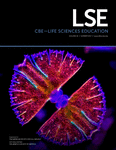How Should I Study for the Exam? Self-Regulated Learning Strategies and Achievement in Introductory Biology
Abstract
In college introductory science courses, students are challenged with mastering large amounts of disciplinary content while developing as autonomous and effective learners. Self-regulated learning (SRL) is the process of setting learning goals, monitoring progress toward them, and applying appropriate study strategies. SRL characterizes successful, “expert” learners, and develops with time and practice. In a large, undergraduate introductory biology course, we investigated: 1) what SRL strategies students reported using the most when studying for exams, 2) which strategies were associated with higher achievement and with grade improvement on exams, and 3) what study approaches students proposed to use for future exams. Higher-achieving students, and students whose exam grades improved in the first half of the semester, reported using specific cognitive and metacognitive strategies significantly more frequently than their lower-achieving peers. Lower-achieving students more frequently reported that they did not implement their planned strategies or, if they did, still did not improve their outcomes. These results suggest that many students entering introductory biology have limited knowledge of SRL strategies and/or limited ability to implement them, which can impact their achievement. Course-specific interventions that promote SRL development should be considered as integral pedagogical tools, aimed at fostering development of students’ lifelong learning skills.



